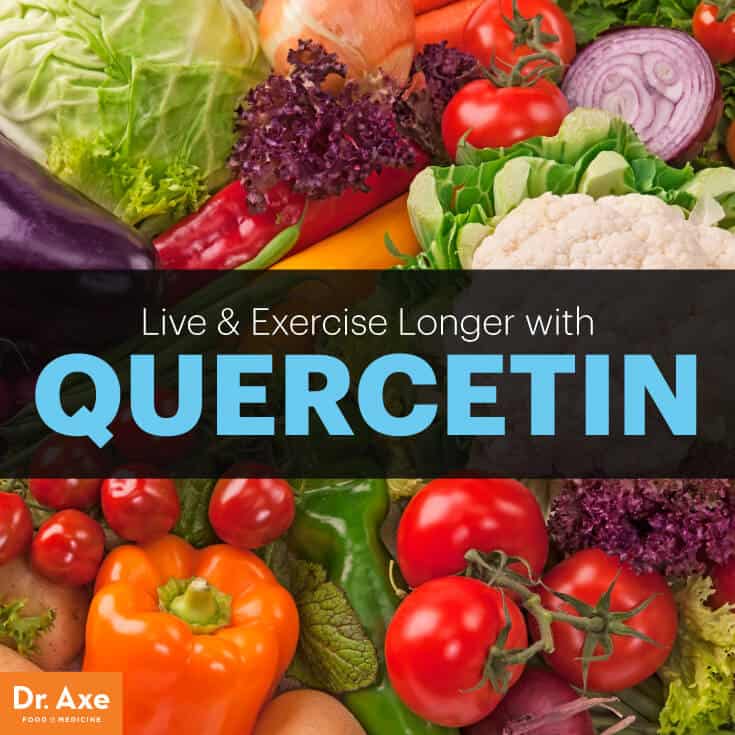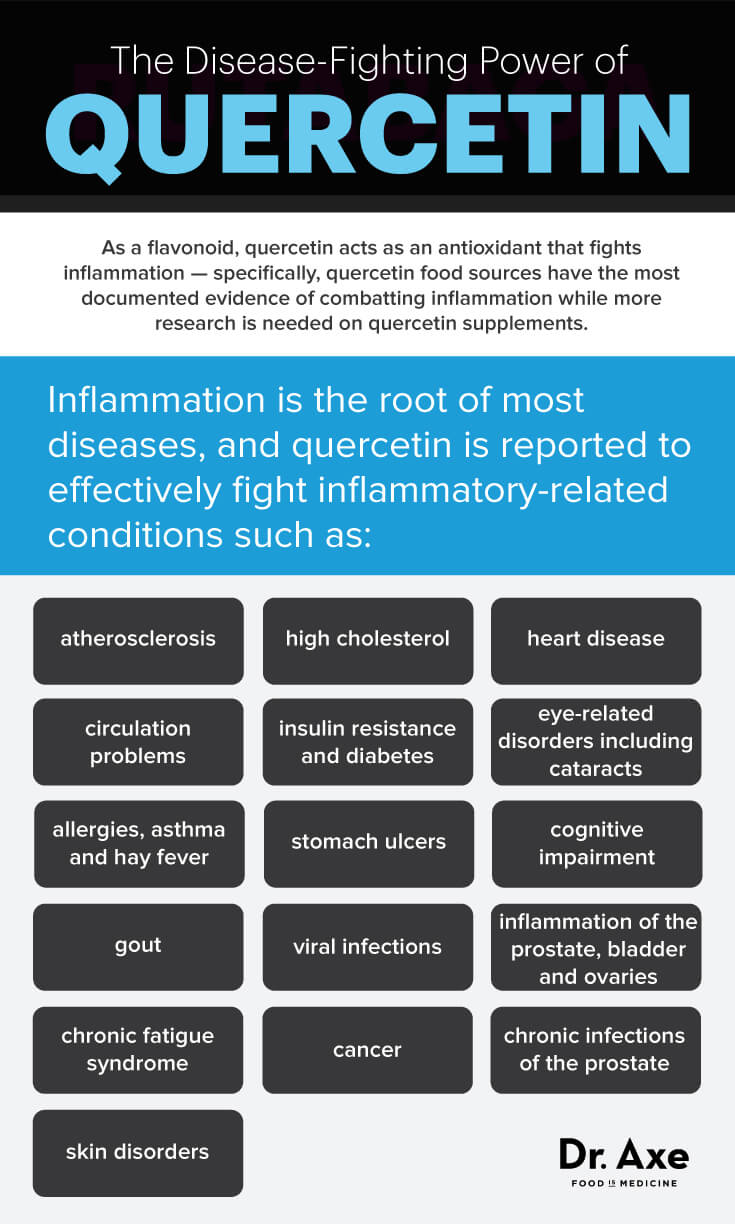
Have you ever wondered what makes a “superfood” super? Or what key superfoods like red wine, green tea, kale and blueberries all have in common? The answer is quercetin, a natural compound tied to what all of us seek: better longevity, heart health, endurance, immune system and more.
Research even shows that quercetin displays anticancer properties. In fact, there isn’t much this powerful antioxidant compound can’t do, especially when combined with the health benefits of bromelain, an anti-inflammatory enzyme.
All this explains why I strongly recommend consuming food sources that contain quercetin regularly. But what are those foods? And how much should you consume? Let’s explore.
Considered one of the most abundant antioxidants in the human diet, quercetin plays an important part in fighting free radical damage, the effects of aging and inflammation. While you can get plenty of quercetin from eating a healthy diet, some people also take quercetin supplements for their strong anti-inflammatory effects.

Benefits of Quercetin
1. Lowers Inflammation
At this time, practitioners and patients report using quercetin to effectively fight conditions related to inflammation, including (6):
- “hardening of the arteries” (atherosclerosis)
- high cholesterol
- heart disease and circulation problems
- insulin resistance and diabetes
- eye-related disorders, including cataracts
- allergies, asthma and hay fever
- stomach ulcers
- cognitive impairment
- gout
- viral infections
- inflammation of the prostate, bladder and ovaries
- chronic fatigue syndrome
- cancer
- chronic infections of the prostate
- skin disorders, including dermatitis and hives
2. Fights Allergies
Quercetin is a natural antihistamine and an anti-inflammatory, making it effective for naturally lowering the effects of season and food allergies, plus asthma and skin reactions.
Quercetin can help stabilize the release of histamines from certain immune cells, which results in decreased symptoms like coughs, watery eyes, runny noses, hives, swollen lips or tongue, and indigestion. In fact, it’s so effective that quercetin is used in ancient Chinese herbal formulas created to block allergies to certain foods (such as peanuts), known as food allergy herbal formulas. Studies show that quercetin, a natural medicine and phytochemical, is equivalent at fighting allergies as some prescription medications, all with little to no side effects.
3. Supports Heart Health
Because of its ability to lower inflammation and oxidative stress, quercetin seems to be beneficial for people with heart and blood vessel-related disorders. For example, eating lots of deeply colored fruits and veggies that contain flavonoids is linked to a lower risk of cardiovascular diease, and even death, in older adults.
Studies done in animal and some human populations show that various types of flavonoids (quercetin, resveratrol and catechins, for example) can help reduce the risk of atherosclerosis, which is a dangerous condition caused by plaque building up within the arteries. Cut-off blood flow in the arteries is one of the primary risk factors for experiencing a heart attack or stroke, which is why cardiac arrest is less likely among people who eat a nutrient-packed diet.
Antioxidants also seem to protect the body from experiencing increases in LDL “bad” cholesterol and can help regulate blood pressure levels. Certain studies show that quercetin prevents damage to LDL cholesterol particles, and it seems that people who eat the most flavonoid-rich foods typically have healthier and lower cholesterol levels, plus less incidence of hypertension. In fact, if you’ve ever heard that red wine is good for your heart, that’s because it’s a natural source of quercetin. It’s one of the main active ingredients in red wine extract, which is associated with healthier heart function.
4. Helps Fight Pain
Taking quercetin supplements can help lower pain associated with autoimmune conditions, such as arthritis, as well as infections, including those of the prostate and respiratory tract. That’s because quercetin reduces inflammatory pain. There’s some evidence from several small studies that people experiencing bladder pains from infections (causing an urgent need to urinate, swelling and burning) have fewer symptoms when taking quercetin supplements.
Flavonoids are also linked to reduced symptoms of prostatitis (inflammation of the prostate) and rheumatoid arthritis (RA). There’s evidence that when patients with RA switch from eating a “typical Western diet” to one higher in antioxidant-rich foods (like uncooked berries, fruits, vegetables, nuts, roots, seeds and sprouts), they experience less pain and reoccurring symptoms, making quercetin a natural arthritis treatment.
5. Might Help Improve Endurance
Quercetin is added to some athletic supplements because it’s believed to help increase athletic performance and endurance, likely because of its positive effects on blood flow. Antioxidants like quercetin could boost physical performance since they help increase the health of blood vessels, which carry oxygen and nutrients to muscle and joint tissue.
Other studies also show that quercetin helps increase immune function and prevents susceptibility to illnesses that can occur when someone trains intensely and experiences exhaustion. One study found evidence that taking 500 milligrams of quercetin twice daily helped protect cyclers from developing exercise-induced respiratory infections following periods of heavy exercise.
6. Might Help Fight Cancer
A Boston University School of Medicine study published in the Journal of Biological Regulators and Homeostatic Agents shows a link between a nutrient-dense diet rich in quercetin plus other antioxidants and a lowered risk of cancer. Quercetin seems to have potential chemo-preventive activity and might have a unique antiproliferative effect on cancerous cells, making it an effective addition to any natural cancer treatment approach.
Flavonoids can help stop the processes involved in cell mutation, the growth of tumors and symptoms related to typical cancer treatments, such as radiation or chemotherapy.
Quercetin is considered a safe treatment approach for stopping cancer, and in the future, we might see it used as a natural therapy instead of, or in conjunction with, conventional methods.
7. Helps Protect Skin Health
Capable of blocking “mast cells,” which are immune cells critical in triggering allergic reactions, inflammatory disease and autoimmune disease, quercetin helps protect skin from the effects of disorders like dermatitis and photosensitivity.
Top Natural Sources of Quercetin
All types of tasty red, green and purple-pigmented plants come packed with quercetin — for example, red wine, blueberries, apples, red onion and even green tea are some of the best sources of quercetin. The amount of quercetin found in plant foods can vary a lot depending on where they’re grown, how fresh they are, how they’re prepared and so on.
Some of the top sources of quercetin to add to your diet include:

Are There Any Side Effects of Quercetin Supplements?
Because it’s derived naturally from foods, quercetin seems to be safe for almost everyone and poses little risks. Most studies have found little to no side effects in people eating nutrient-dense diets high in quercetin or taking supplements by mouth short term. Amounts up to 500 milligrams taken twice daily for 12 weeks appear to be very safe.
For women who are pregnant or breast-feeding, quercetin doesn’t seem to have any negative effects, although there hasn’t been much research done in this population so it’s always a good idea to talk it over with your doctor first.
It’s always simple to Stay Healthy!
